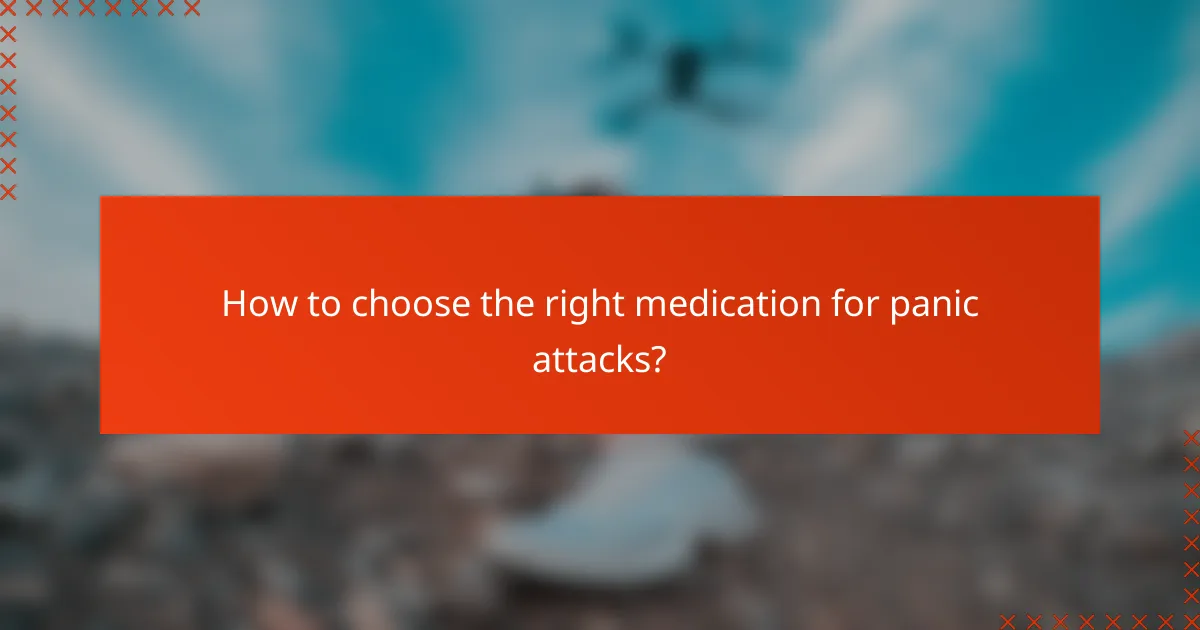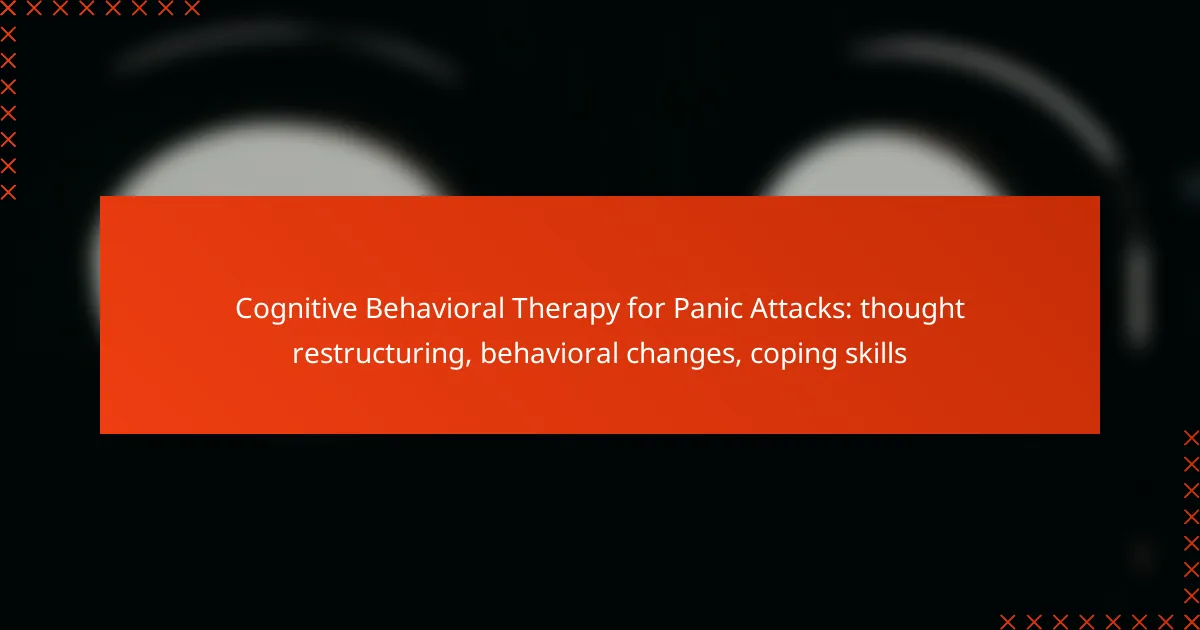Panic attacks can be effectively managed with various medication options, including SSRIs and benzodiazepines, each tailored to individual needs. SSRIs, such as fluoxetine and sertraline, work by increasing serotonin levels to alleviate anxiety, while benzodiazepines provide rapid relief from acute symptoms. Understanding the differences and potential side effects of these medications is crucial for effective treatment.

What medication options are available for panic attacks?
Several medication options exist for managing panic attacks, including SSRIs, benzodiazepines, beta-blockers, buspirone, and antidepressants. Each type of medication works differently and may be suitable for different individuals based on their specific symptoms and medical history.
SSRIs
Selective serotonin reuptake inhibitors (SSRIs) are commonly prescribed for panic attacks as they help increase serotonin levels in the brain, which can improve mood and reduce anxiety. Medications like fluoxetine and sertraline are examples of SSRIs that may take several weeks to show effects.
When considering SSRIs, it’s essential to discuss potential side effects, which can include nausea, insomnia, and sexual dysfunction. Regular follow-ups with a healthcare provider can help monitor progress and adjust dosages if necessary.
Benzodiazepines
Benzodiazepines, such as lorazepam and alprazolam, are fast-acting medications that can provide immediate relief from panic attacks. They work by enhancing the effects of a neurotransmitter called GABA, leading to a calming effect.
However, benzodiazepines are typically recommended for short-term use due to the risk of dependence and withdrawal symptoms. It’s crucial to use them cautiously and under a doctor’s guidance, especially if you have a history of substance use disorders.
Beta-blockers
Beta-blockers, like propranolol, are primarily used to manage physical symptoms of anxiety, such as rapid heartbeat and trembling. They can be particularly useful for situational anxiety, such as public speaking, rather than for ongoing panic disorder treatment.
These medications work by blocking adrenaline effects, which can help reduce the physical sensations associated with panic attacks. Discussing their use with a healthcare provider can help determine if they are appropriate for your specific situation.
Buspirone
Buspirone is an anxiolytic that can be effective for chronic anxiety and may help with panic attacks. Unlike benzodiazepines, it does not cause sedation and has a lower risk of dependence.
It may take several weeks to achieve its full effect, so patience is necessary. Side effects can include dizziness and nausea, but these are generally mild compared to other anxiety medications.
Antidepressants
In addition to SSRIs, other types of antidepressants, such as SNRIs (serotonin-norepinephrine reuptake inhibitors), can also be effective in treating panic attacks. Medications like venlafaxine may help by balancing both serotonin and norepinephrine levels.
As with SSRIs, these medications may take time to work and can have side effects, including weight gain and increased blood pressure. Regular consultation with a healthcare provider is essential to find the right medication and dosage for your needs.

How do SSRIs help with panic attacks?
Selective serotonin reuptake inhibitors (SSRIs) are commonly prescribed to manage panic attacks by increasing serotonin levels in the brain. This enhancement of serotonin can lead to improved mood and reduced anxiety, making it easier for individuals to cope with panic symptoms.
Increase serotonin levels
SSRIs work by blocking the reabsorption of serotonin in the brain, which increases its availability in the synaptic space. This process can help stabilize mood and reduce feelings of panic. Common SSRIs include fluoxetine, sertraline, and escitalopram, which are often effective in treating anxiety disorders.
When starting SSRIs, it may take several weeks to notice significant changes in serotonin levels and mood. Patients should be aware that dosage adjustments might be necessary to find the most effective level for their specific needs.
Reduce anxiety symptoms
By increasing serotonin levels, SSRIs can effectively reduce anxiety symptoms associated with panic attacks. Many individuals report fewer panic episodes and a decrease in the intensity of anxiety when on these medications. This can lead to improved daily functioning and quality of life.
It’s important to monitor for side effects, which can include nausea, insomnia, or sexual dysfunction. Patients should communicate openly with their healthcare provider about any adverse effects to ensure the best treatment plan is in place.

What are the common benzodiazepines for panic attacks?
Benzodiazepines are frequently prescribed for managing panic attacks due to their fast-acting nature and effectiveness in reducing anxiety symptoms. Common options include alprazolam, clonazepam, and diazepam, each with unique properties and considerations for use.
Alprazolam
Alprazolam, often known by the brand name Xanax, is a popular benzodiazepine used to treat panic disorders. It works by enhancing the effects of a neurotransmitter called GABA, which helps to calm the nervous system.
This medication is typically taken as needed for acute anxiety episodes, with effects usually felt within 30 minutes. However, it can lead to dependence if used long-term, so it is important to follow a doctor’s guidance.
Clonazepam
Clonazepam, marketed as Klonopin, is another effective benzodiazepine for panic attacks. It has a longer duration of action compared to alprazolam, making it suitable for those who experience frequent panic episodes.
This medication can be taken daily or on an as-needed basis, but users should be cautious of potential side effects such as drowsiness or dizziness. Regular monitoring by a healthcare provider is recommended to avoid tolerance and dependence.
Diazepam
Diazepam, commonly known as Valium, is a benzodiazepine that can also be prescribed for panic attacks. It has a longer half-life, which means it stays in the body longer, providing sustained relief from anxiety symptoms.
While effective, diazepam can cause sedation and may not be the best choice for individuals needing to remain alert. It is crucial to discuss with a healthcare professional to determine the appropriate dosage and duration of treatment to minimize risks associated with long-term use.

What are the side effects of SSRIs and benzodiazepines?
SSRIs and benzodiazepines can cause a range of side effects that vary in severity and duration. Understanding these effects is crucial for making informed decisions about treatment options for panic attacks.
SSRIs: nausea, insomnia
Selective serotonin reuptake inhibitors (SSRIs) often lead to side effects such as nausea and insomnia. Nausea may occur shortly after starting the medication and can diminish over time, while insomnia can disrupt sleep patterns, making it harder to fall or stay asleep.
Patients may find it helpful to take SSRIs with food to mitigate nausea. If insomnia persists, discussing alternative dosing times or adjunctive treatments with a healthcare provider is advisable.
Benzodiazepines: drowsiness, dependency
Benzodiazepines are known for causing drowsiness, which can impair daily activities and increase the risk of accidents. This sedative effect is often why they are prescribed for short-term relief of panic attacks.
However, long-term use can lead to dependency, making it difficult to stop taking the medication without experiencing withdrawal symptoms. It’s essential to use benzodiazepines under strict medical supervision and to explore non-pharmacological options for managing anxiety when possible.

How to choose the right medication for panic attacks?
Choosing the right medication for panic attacks involves consulting with a healthcare professional and considering your personal health history. This ensures that the selected treatment aligns with your specific needs and minimizes potential side effects.
Consult a healthcare professional
Consulting a healthcare professional is crucial when selecting medication for panic attacks. They can evaluate your symptoms, discuss treatment options, and recommend either SSRIs or benzodiazepines based on your individual circumstances.
Healthcare providers often consider factors such as the severity of your panic attacks, any co-occurring mental health conditions, and your overall health profile. They may also monitor your response to medication and adjust dosages as needed.
Consider personal health history
Your personal health history plays a significant role in medication selection for panic attacks. Previous experiences with medications, existing health conditions, and family history of mental health issues can influence the effectiveness and safety of certain treatments.
For example, if you have a history of substance abuse, benzodiazepines may not be advisable due to their potential for dependence. On the other hand, SSRIs might be a better fit if you have other anxiety disorders. Always discuss your complete health background with your healthcare provider to ensure the best choice.

What are the long-term effects of panic attack medications?
The long-term effects of medications for panic attacks can vary significantly based on the type of medication used. Selective serotonin reuptake inhibitors (SSRIs) and benzodiazepines are common options, each with distinct implications for mental health and tolerance over time.
Potential for tolerance
Benzodiazepines, often prescribed for immediate relief during panic attacks, can lead to tolerance when used over extended periods. This means that individuals may require higher doses to achieve the same calming effects, increasing the risk of dependence.
In contrast, SSRIs generally do not lead to tolerance in the same way. However, some individuals may find that their initial effectiveness diminishes over time, necessitating adjustments in dosage or medication type.
Impact on mental health
Long-term use of benzodiazepines can contribute to cognitive impairment and increased anxiety levels once the medication is discontinued. This rebound effect can complicate recovery and may require additional therapeutic interventions.
SSRIs, while effective for many, can also have side effects such as weight gain, sexual dysfunction, or emotional blunting. Regular consultations with a healthcare provider are essential to monitor these effects and make necessary adjustments to treatment plans.

What are alternative treatments for panic attacks?
Alternative treatments for panic attacks include various medications and therapies that can help manage symptoms. Common options are selective serotonin reuptake inhibitors (SSRIs) and benzodiazepines, each with distinct effects and side effects.
SSRIs
SSRIs are a class of medications commonly prescribed to treat anxiety and panic disorders. They work by increasing serotonin levels in the brain, which can help improve mood and reduce anxiety symptoms over time.
Typical SSRIs include fluoxetine, sertraline, and escitalopram. These medications may take several weeks to show noticeable effects, so patience is essential when starting treatment. Side effects can include nausea, insomnia, and sexual dysfunction, but many people find these manageable.
Benzodiazepines
Benzodiazepines are fast-acting medications that can provide immediate relief from panic attack symptoms. They work by enhancing the effect of a neurotransmitter called gamma-aminobutyric acid (GABA), which helps calm the nervous system.
Common benzodiazepines include alprazolam, lorazepam, and diazepam. While effective for short-term use, they carry a risk of dependence and withdrawal symptoms, making them less suitable for long-term management. It’s crucial to use these medications under a doctor’s supervision and only for brief periods.
Side Effects
Both SSRIs and benzodiazepines can cause side effects that vary by individual. SSRIs may lead to gastrointestinal issues, weight gain, or emotional blunting, while benzodiazepines can cause drowsiness, dizziness, and cognitive impairment.
Monitoring for side effects is essential, especially when starting a new medication. Discuss any adverse reactions with a healthcare provider to adjust treatment as needed and ensure the safest and most effective approach to managing panic attacks.



